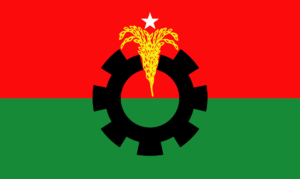 by M Serajul Islam : IN SOUTH Asia’s pre- and post-colonial political history, no political party has faced as much oppression as the Bangladesh Nationalist Party has under the current Awami League regime except what the latter faced during the war of liberation. There is a difference though between the oppression that the Awami League faced in 1971 under Pakistan’s military regime and what the Bangladesh Nationalist Party has faced since January 2009, when the Awami League assumed office.
by M Serajul Islam : IN SOUTH Asia’s pre- and post-colonial political history, no political party has faced as much oppression as the Bangladesh Nationalist Party has under the current Awami League regime except what the latter faced during the war of liberation. There is a difference though between the oppression that the Awami League faced in 1971 under Pakistan’s military regime and what the Bangladesh Nationalist Party has faced since January 2009, when the Awami League assumed office.
In 1971, the Awami League’s top leadership crossed the border into India after Bangabandhu had surrendered to the Pakistan military on the night of March 25–26. Thus, the Awami League’s top leadership was in safety in Kolkata. The Indian government and its intelligence looked after the Awami League’s top leadership during the nine months that the Pakistani military carried out its crimes against inhumanity inside Bangladesh.
The BNP leadership as well as its grass roots have had no such luck. The Awami League regime has relentlessly persecuted them because they had no friendly country to flee. The extent of such persecution was revealed by the Bangladesh Nationalist Party at a seminar for foreign diplomatic missions and the civil society held in Dhaka recently. The seminar chaired by the BNP secretary general Mirza Fakhrul Islam Alamgir was titled ‘A Democratic Future for Bangladesh and the Indo-Pacific Strategy.’ The BNP’s foreign affairs committee chairman Amir Khashru Mahmud Chowdhury presented the paper.
The paper came up with mind-boggling statistics on the persecution that the Bangladesh Nationalist Party has faced in leading people’s movement against the Awami League regime’s efforts to turn the country into a one-party state. Thus far, 1,204 BNP leaders and activists have been victims of enforced disappearances; 1,539 have died in political killing in crossfire and 799 in extrajudicial killings. The Awami League regime has filed 1,41,633 ‘fabricated and unfounded cases’ involving 49,47,019. These figures, reprehensible as they are, abated significantly following the US sanctions in December 2021 on the Rapid Action Battalion and the police for serious rights violations.
Khaleda Zia, the BNP chairperson, is in the twilight zone between life and death for her life-threatening medical condition and incarceration since 2018 through politically motivated cases. The regime has not allowed her to go abroad for treatment not available at home. Tareq Zia has been exiled and is running the BNP as the acting chairman from London. He has kept the party united and energised. In between, the Awami League regime has tried to break the BNP through the proverbial ‘Mir Jafars’ that has failed. The Bangladesh Nationalist Party is leading today the most courageous and determined movement for democracy and human and political rights against odds that few political parties in the history of such movements in developing countries have faced.
The Bangladesh Nationalist Party has successfully brought the entire opposition parties and forces under one umbrella without resorting to violence. The Awami League regime’s efforts to use every imaginable and unimaginable way to break the BNP have only enhanced the latter’s resolve and determination to fight the regime in the same spirit and determination with which the people fought the Pakistani military in 1971. Thus, the Bangladesh Nationalist Party today is more united and determined to fight and defeat the Awami League regime that has systematically thwarted people’s political, democratic and human rights.
The seminar flagged the BNP’s role in the nation’s fight for democracy, and human and political rights. It also gave a vision for the nation that would help Bangladesh to get back on its feet in a post-AL regime where whichever party assumes office will have to rebuild Bangladesh institutionally, politically and in the context of critical foreign relations from scratch.
It is now an open secret that the Awami League regime has systematically weakened all institutions of nation-building to make Bangladesh and the Awami League one with the interests of the party dominating over and subservient to the interests of the country. Today, the civil bureaucracy, the law enforcement agencies and even constitutional bodies such as the Election Commission are indistinguishable from the ruling party. Or else, the deputy commissioner of Jamalpur would not have openly and unashamedly sought people’s support for the ruling party or ambassadors abroad would not have been present and anchored the prime minister’s political meetings abroad with the Awami League diaspora.
The Awami League regime has, meanwhile, managed to turn the United States, in particular, and the west, in general, into Bangladesh’s adversaries. It did so oblivious of the fact that it would need the US-west in an indispensable manner for graduating to a middle-income country.
The Awami League regime has, thus, damaged Bangladesh’s critically important relations with the Biden administration although the United States is pursuing democracy and human and political rights in its bilateral relations with Bangladesh because these are against its interests in Bangladesh’s current politics. The regime has also deliberately brought the US’s 1971 role into the equation to create an anti-US sentiment although the Biden administration is pursuing the issues for which Bangladesh fought its liberation war.
The Awami League regime also stated for the same reason, to create an anti-US sentiment in Bangladesh, that the Biden administration would stop opposing if it gave it St Martins Island to the United States to build a military base although it was told to the contrary by the high delegations that visited Dhaka in recent times.
The Awami League regime also tried to derail the Biden administration’s Indo-Pacific Strategy, which is a win-win strategy for Bangladesh and the nations in the Indo-Pacific. The regime gave lip service to the IPS with its Indo-Pacific Outlook that it announced in April. The Biden administration ignored the Awami League regime’s Indo-Pacific Outlook because it knew that if the regime was serious, it would not have accused the United States of seeking a military base after senior US officials had informed the AL regime to the contrary.
The BNP’s seminar on embracing IPS was, therefore, a smart move for the future of Bangladesh and the region as an examination of the strategy would reveal. The IPS is free and open with ‘governance that is transparent and responsive to the people.’ It is based upon connectivity in all its facets to bring nations closer to one another. The IPS is also based upon a free, fair, open and reciprocal trade regime to make the region prosperous. It stresses resilience for improved health security and economic ability to help nations ‘withstand climate change, pandemics and transnational threats.’ Finally, the IPS is secure as it ensures ‘movements of people, ideas, and goods across the international sea, land, and air borders and cyberspace are made legally.’
The Biden administration’s Indo-Pacific Strategy is, thus, the USA’s soft power approach for the Indo-Pacific region to deal with China’s expansion by avoiding the military path. Its present involvement in Bangladesh in pursuit of democracy and rights is also in pursuit of its Indo-Pacific Strategy which is why it is so determined to ensure that Bangladesh succeeds in holding its next general election freely, fairly, and peacefully for democracy, human and political rights to succeed.
The BNP’s seminar on democracy and the IPS was, therefore, extremely important. It flagged the need for the country to commit itself again to the causes for which millions embraced martyrdom in 1971. The BNP’s seminar also flagged the need for Bangladesh to embrace the Biden administration’s IPS, which has everything not just to save democracy and rights that are on the slippery slope but also to transform Bangladesh into a middle-income country and beyond as a liberal democracy.
M Serajul Islam is a former career ambassador.
New Age









